Filed under:
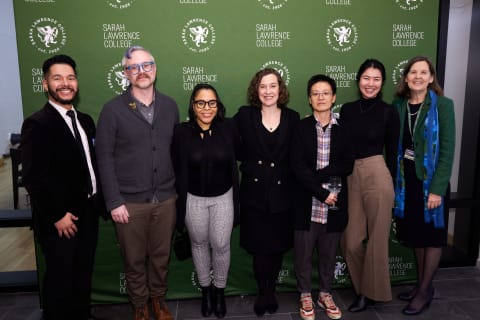

On February 7, community partner organizations and elected officials joined Sarah Lawrence College faculty, staff, and students for “A Celebration of Community”, an event held to honor the work of all those involved in the Mellon Grant for Civic Engagement. Armando Bengochea and SJ Waldman, representatives from the Mellon Foundation, also joined in the salute to the tangible and transformative outcomes of this grant.
Five years ago, in a groundbreaking initiative fueled by a generous $1.2 million grant from the Mellon Foundation, Sarah Lawrence began the work to redefine the answer to a hypothetical but critically important question posed by the Foundation: "If Sarah Lawrence College went away tomorrow, what would your neighbors say?"
President Cristle Collins Judd noted during her opening remarks that the answer to this question has a decidedly different answer today than it did when first presented to the College thanks to the work spearheaded by collaboration between Mellon Fellows and community partners. “We’ve radically changed how our neighbors perceive us,” said Judd. “The relationship we have with the community today is based on reciprocity and the co-creation of knowledge.”
A hallmark of the work supported by the Mellon grant – and a huge key to its success – has been the intentional blurring of boundaries between academia and the community. And its most original and pathbreaking feature has been the piloting of a new type of faculty role: grant-funded faculty fellows in the public humanities teach undergraduate classes at Sarah Lawrence and are embedded in partner organizations, becoming active contributors to the cultural and educational initiatives of ArtsWestchester, the Hudson River Museum, Wartburg, Yonkers Arts, and the Yonkers Public Library. As a result, the College has created a network that amplifies the impact of community engagement that underscores the power of collective efforts in addressing societal challenges and fostering a sense of shared responsibility.
Judd emphasized that the College’s active involvement in community initiatives has fostered a mutually beneficial relationship, challenging traditional educational boundaries. This evolution showcases the potential for positive change when academic institutions actively engage with their surroundings.
Jesse Montero, director of the Yonkers Public Library, reflected on his institution’s relationship with the College: “It's rare, maybe unique, for a public library and a college to have this level of collaboration, and the Mellon Grant for Civic Engagement can be credited for jumpstarting much of it. It's a testament to Sarah Lawrence College's faculty and students that they take such an interest in engaging with the Yonkers community outside their beautiful campus, and the library and its patrons are all the better for it."
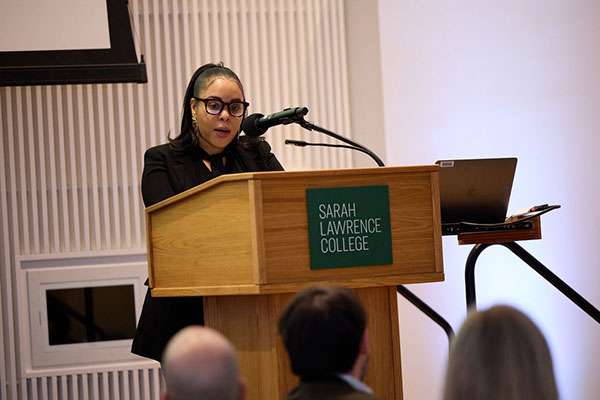 Dr. Kishauna Soljour, who served as a Mellon Public Humanities Fellow embedded in the Yonkers Public Library from 2020 to 2022, delivered the event’s keynote address. During her remarks, Soljour emphasized the importance of deep imagination, creativity, and commitment to the public good. “Public humanities has the power to break down the divisions between scholars and practitioners,” she said, “and this work is being done in libraries, museums, K–12 schools, faith-based organizations, historic sites, and other locations of cultural production around the world.”
Dr. Kishauna Soljour, who served as a Mellon Public Humanities Fellow embedded in the Yonkers Public Library from 2020 to 2022, delivered the event’s keynote address. During her remarks, Soljour emphasized the importance of deep imagination, creativity, and commitment to the public good. “Public humanities has the power to break down the divisions between scholars and practitioners,” she said, “and this work is being done in libraries, museums, K–12 schools, faith-based organizations, historic sites, and other locations of cultural production around the world.”
Her insights set the stage for the Mellon Fellows’ presentations, in which they shared the projects they’ve worked on and the impact they have made.
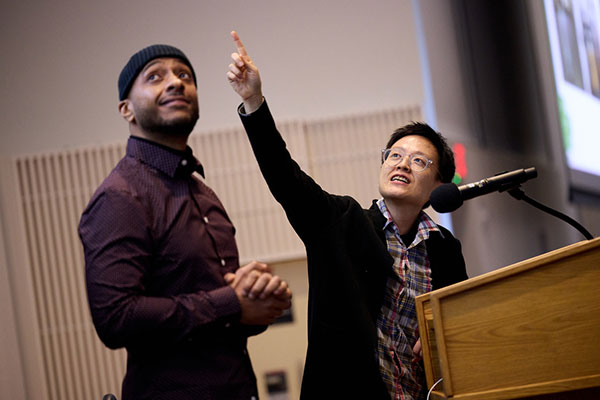 Yeong Ran Kim, Mellon Digital Humanities Fellow, spoke about the challenges of starting their project during Covid lockdowns and the creativity required to ensure success. Kim’s focus is on helping youth tell their stories through digital media and they established a documentary filmmaking program for local youth that had to be paused due to obstacles that came with the pandemic. Eventually, with community support, Kim launched a digital media education program for local youth on campus in 2021 as the College reopened. Then, building upon their work with public art exhibits, and Kim’s experience with documentary filmmaking, they connected with Yonkers Arts “Art in the Park” initiative, which seeks to bring the arts directly into community spaces by beautifying parks and basketball courts through murals, sculpture, and transforming natural landmarks in creative ways to become art themselves. As a component of this partnership, Sarah Lawrence student artists participated in the creation of these projects.
Yeong Ran Kim, Mellon Digital Humanities Fellow, spoke about the challenges of starting their project during Covid lockdowns and the creativity required to ensure success. Kim’s focus is on helping youth tell their stories through digital media and they established a documentary filmmaking program for local youth that had to be paused due to obstacles that came with the pandemic. Eventually, with community support, Kim launched a digital media education program for local youth on campus in 2021 as the College reopened. Then, building upon their work with public art exhibits, and Kim’s experience with documentary filmmaking, they connected with Yonkers Arts “Art in the Park” initiative, which seeks to bring the arts directly into community spaces by beautifying parks and basketball courts through murals, sculpture, and transforming natural landmarks in creative ways to become art themselves. As a component of this partnership, Sarah Lawrence student artists participated in the creation of these projects.
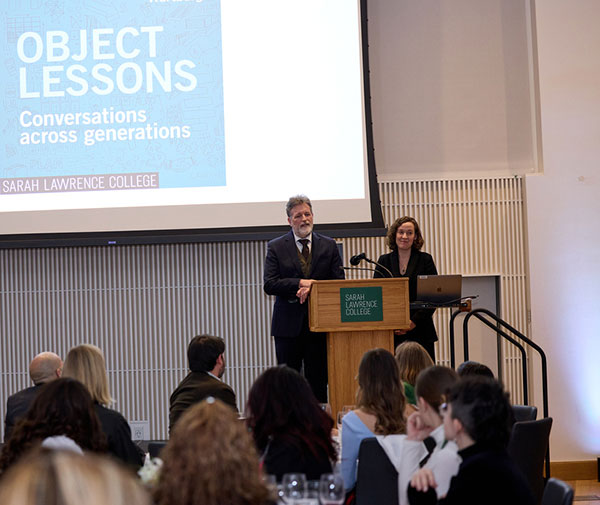 Emily Bloom, Mellon Public Humanities Fellow embedded at Wartburg, spoke about collaborating with the Wartburg Adult Care Community in Mount Vernon to connect undergraduates and senior citizens in a series of podcast conversations about objects, memories, and the things that matter to us all. Program participants notably mentioned how much they enjoyed the diversity of classes and events offered. Wartburg resident Jane Keegan said, “I didn’t know what to expect when I joined Myra Goldberg’s storytelling class which was comprised mostly of Sarah Lawrence students and a few of us Wartburg old folks. As we shared our stories on various topics, an amazing bonding happened and our disparate groups became one.”
Emily Bloom, Mellon Public Humanities Fellow embedded at Wartburg, spoke about collaborating with the Wartburg Adult Care Community in Mount Vernon to connect undergraduates and senior citizens in a series of podcast conversations about objects, memories, and the things that matter to us all. Program participants notably mentioned how much they enjoyed the diversity of classes and events offered. Wartburg resident Jane Keegan said, “I didn’t know what to expect when I joined Myra Goldberg’s storytelling class which was comprised mostly of Sarah Lawrence students and a few of us Wartburg old folks. As we shared our stories on various topics, an amazing bonding happened and our disparate groups became one.”
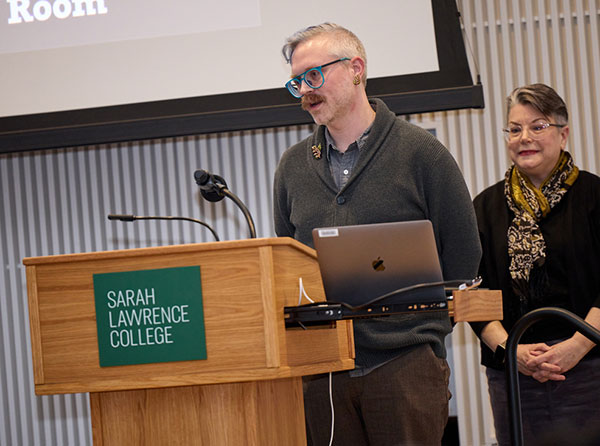 Benjamin Zender, Mellon Public Humanities Fellow embedded at the Yonkers Public Library, talked about an initiative they are leading that reimagines the library’s special collections in the “local history room” as a vibrant community space. Zender’s projects focus on community building and democratizing library collections practices. Last Fall, the Yonkers Public Library held “People’s History Day '', a day-long event exploring heritage through genealogy, understanding the value of personal objects in telling history, recording familiar stories through oral history, and a community panel on art and activism. This event also provided Yonkers-area residents with the chance to bring their own photos and mementos to the library’s first “scan-a-thon,” which was an opportunity to digitize files and add local history to the library’s digital archives.
Benjamin Zender, Mellon Public Humanities Fellow embedded at the Yonkers Public Library, talked about an initiative they are leading that reimagines the library’s special collections in the “local history room” as a vibrant community space. Zender’s projects focus on community building and democratizing library collections practices. Last Fall, the Yonkers Public Library held “People’s History Day '', a day-long event exploring heritage through genealogy, understanding the value of personal objects in telling history, recording familiar stories through oral history, and a community panel on art and activism. This event also provided Yonkers-area residents with the chance to bring their own photos and mementos to the library’s first “scan-a-thon,” which was an opportunity to digitize files and add local history to the library’s digital archives.
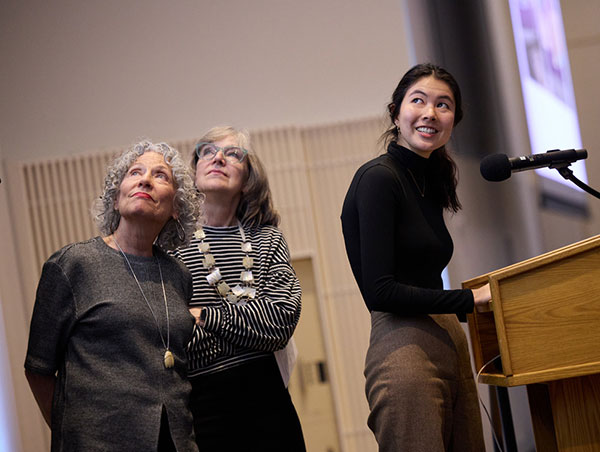 Karintha Lowe, Public Humanities Fellow embedded at the Hudson River Museum, is responsible for organizing a number of exhibitions including in the Community & Partnership Gallery of the Museum’s new West Wing. The new gallery offers an inviting and experimental space for displays that will feature local, regional, and emerging artists, including work by artists-in-residence, community collaborations, and inventive partnerships with schools and universities. Lowe also plans and executes programming in support of the exhibitions with the goal of engaging the local community with the Museum.
Karintha Lowe, Public Humanities Fellow embedded at the Hudson River Museum, is responsible for organizing a number of exhibitions including in the Community & Partnership Gallery of the Museum’s new West Wing. The new gallery offers an inviting and experimental space for displays that will feature local, regional, and emerging artists, including work by artists-in-residence, community collaborations, and inventive partnerships with schools and universities. Lowe also plans and executes programming in support of the exhibitions with the goal of engaging the local community with the Museum.
As we enter the final phase of funding from the Mellon Grant for Civic Engagement, our work towards collaborative community building continues apace. Through a new grant from the Endeavor Foundation, the College will be able to continue to bring together work on campus and in surrounding communities. For the next several years, Endeavor Public Engagement Fellows will teach half-time at the College while also working within local organizations. And just last year, the College was awarded another grant from the Mellon Foundation, this time for $1.5 million to address the climate crisis and environmental justice through the Humanities. In partnership with Bronx Community College, this grant, which is now the largest programmatic grant in the college’s history, a title previously held by the Mellon Grant for Civic Engagement, rethinks the humanities through the lens of climate and environmental justice by developing creative, collaborative pedagogies to address the climate crisis. This spring, four art exhibitions at Sarah Lawrence College and Bronx Community College explore modes of ‘care’ in response to violent pasts and presents. Against the urgency and presentism suggested by “climate crisis,” these exhibitions turn to responses that might be considered careful and slow, and that shed light on the long histories of environmental devastation on this continent shaped by settler colonialism and racial capitalism. https://careandclimatejustice.org/